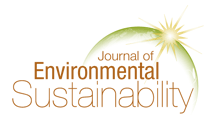Creative Commons License

This work is licensed under a Creative Commons Attribution 4.0 International License.
Abstract
The implications of climatic changes have been predicted to have devastating effects on biodiversity condition particularly nature-based tourism. In this study, investigation on the climatic characteristics in Ikogosi-Ekiti, Nigeria was conducted. Also, spatio-temporal changes of green and non-green cover were analysed for the study.
Climatic data from Nigeria Meteorological Agency (NIMET) for a period of 1975-2014 were analyzed to reveal the trend of climatic changes using appropriate statistical tool. A 30 meter Landsat image of TM 1991, ETH+ 2002 and OLI 2015 were used for the study. The satellite images were digitally processed using Arcgis10.3 and Fragstat 3.0. Species Diversity and Normalized Difference Vegetation Index (NDVI) analysis was conducted to assess the vegetation degradation in the study area.
The result showed that rainfall and temperature pattern between the year 1975 to 2014 experience an upward trend with maximum rainfall observed in year 2010 (1692.500mm) and temperature distribution reached its peak in year 2010 (27.046o C); annual temperature increment over the years is at regression model 0.016o C per year. Furthermore, results showed that anthropogenic activities as a result of tourism developmental programmes accounted for 25.93% increase in built-up between the periods of 1991 and 2015 with a substantial loss (29.97%) of dense vegetation were observed within the study area. In addition, Shannon Diversity Index (SHIDI) showed diversity decrease of 0.54, 0.47 and 0.21 for year 1991, 2002 and 2015 respectively; NDVI analysis revealed a degraded vegetation with the epoch of the years assessed. The result revealed that changes in rainfall and temperature pattern negatively affected the luxuriant vegetation; uncultured human activities led to massive reduction in the quality of remnant forest. However, tourism vegetation potentials of the study area were threatened; hence, ecosystem imbalance and animal migration were observed.
The study concluded that climate change and vegetation removal has significant effect on the green infrastructures, nature-based tourism and biodiversity conservation. The study recommends a need for ecotourism practices and strict protection of the tourist site
Recommended Citation
Aniramu, Opeyemi S. Mr.; Coker, Olabiyi O. Mr.; and Odelola, Raphael G. Mr.
(2021)
"Nature-Based Tourism Sustainability and Climatic Change Implication in Ikogosi Resort, Southwestern Nigeria,"
Journal of Environmental Sustainability: Vol. 8:
Iss.
1, Article 2.
Available at:
https://repository.rit.edu/jes/vol8/iss1/2
Included in
Environmental Studies Commons, Geographic Information Sciences Commons, Social and Cultural Anthropology Commons
